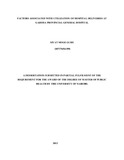Prevalence of poor sleep quality and high risk for Obstructive sleep Apnoea in ambulant individuals with type two Diabetes Mellitus attending outpatient clinics at the Kenyatta National Hospital

Date
2013Author
Sokwalla, Sairabanu Mohammed R
Type
ThesisLanguage
enMetadata
Show full item recordAbstract
Background: There is a recognized interrelationship between sleep disturbances, insulin resistance, obesity, type 2 diabetes and cardiovascular diseases. Prevalence of sleep disturbances has been found to be higher in patients with type 2 diabetes than the general population. However, the burden of sleep disorders in Kenyans, and particularly in individuals with type 2 diabetes is unknown thus this study is a baseline and will promote further studies in the field.
Objectives: We set out to assess sleep quality and prevalence of high risk for obstructive sleep apnoea (OSA) among persons with type 2 diabetes and an age and sex matched healthy comparison group. We also determined associations of sleep disturbances with socio-demographic and anthropometric variables in patients with type 2 diabetes.
Study Design: Cross- sectional descriptive study with a comparative arm.
Study participants and study site: Patients with diagnosed type 2 diabetes who consented to the study were considered cases and an age and sex matched healthy non diabetic group was labelled as comparison group. The study was conducted in the diabetic outpatient clinics of Kenyatta National Hospital.
Methods: Quality of sleep and risk for OSA were determined in a randomly
selected sample of patients with type 2 diabetes and an age and sex matched healthy non- diabetic comparison group, using the Pittsburgh Sleep Quality Index (PSQI) and the Berlin Questionnaire (BQ) respectively. Associations between poor sleep quality, high
risk for OSA and various socio-demographic and anthropometric variables in patients with type 2 diabetes were explored. Associated variables were subjected to logistic regression analysis and Beta coefficient testing. Analysis was conducted using SPSS version 17.0.
Results: The study was conducted between the second week of October 2013 and end of
November 2013. From 250 patients with diabetes mellitus screened, 223 were recruited;
53.8% were females, mean BMI was 28.8 (±4.4) kg/m2 and mean age 56.8 (±12.2) years. Of these, 119 (53% , 95% CI 46.5, 60.2) had poor sleep quality, and 99 (44% 95% CI
37.8, 50.9) were at high risk for OSA. Increasing age and higher BMI were independently associated with a high risk for OSA. Among the 112 age and sex matched non- diabetic comparison group, 33 (29.5%, 95% CI 20.9, 38.3) had poor sleep quality and 9 (8%, CI
3.3, 13.4) had high risk for OSA.
Conclusions: Patients with type 2 diabetes have a high and undetected prevalence of sleep disorders, namely poor sleep quality and high risk for OSA.
Citation
Masters of Medicine In Internal MedicinePublisher
University of Nairobi School of Medicine
